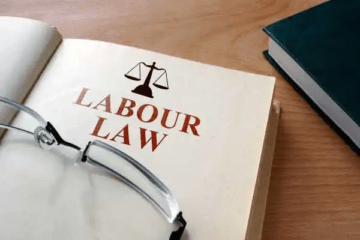
This article is written by Anjali Bajaj of Gopaldas Jhamatmal Advani Law College, Bandra, Maharashtra, an intern under Legal Vidhiya
ABSTRACT
The practice of Domestic Enquiry in organizations is increasing day by day. Domestic Enquiry is identical to a trial in a court of law. Domestic Enquiry is initiated against the offences committed in the establishment for misconduct, punishable under standing orders/conduct and discipline rules and regulations of organizations. Domestic Enquiry needs to be tackled according to the Principles of Natural Justice. In such enquiries, the matter is decided by the disciplinary authority or administrative officers and not by the courts of law. It is an investigation that is to be conducted by the management or employer to examine the facts of the case and take appropriate disciplinary action, if necessary. It allows employees to present their evidence and arguments and ensures that disciplinary action shall depend on a thorough investigation of the facts.
Keywords:
Principle of Natural Justice, Nemo in propria causa judex, esse debet, Audi alteram partem, internal investigation, the opportunity of being heard, appropriate disciplinary action.
Governed By:
Domestic enquiry is not considered as a legal requirement under the Industrial Disputes Act, or other substantive laws such as the Factories act, Mines Act, etc. but has been provided under the standing orders to be framed in the Industrial Employment (Standing Order Act) 1946. As a result, it is now well-established that such standing orders have the force of law and constitute statutory terms of employment
INTRODUCTION
- Domestic Enquiry
Domestic Enquiry is generally applicable for an enquiry into alleged indiscipline and misconduct. Domestic Enquiry is a universally accepted concept that extends to all court and enquiry jobs. It is common for disciplinary authorities in a department or industry to appoint a competent person as an officer or officers to inquire into the allegations against an employee. They are commonly referred to as “investigations” and are also known as domestic enquiries.
Dismissing an employee without a fair and just domestic investigation amounts to a violation of the laws of natural justice and is mortification to the Labour Courts/Industrial Tribunals. As a result, adverse decisions or actions will be taken against the contractor.
In addition, the investigating officer cannot punish the employee when he verifies the facts, evidence, and the Guilty Rules. Only the Supervisor or Approving entity, known as the notified regulatory authority, can impose the penalty and take appropriate action.
- Principles Of Natural Justice
- Nemo in propria causa judex, esse debet
“No one should be made a judge in his own case, or the rules against bias”
- Audi alteram partem
“Hear the other party, or the rule of fair hearing, or the rule that no one should be condemned unheard.
- Disciplinary Action
In common parlance, where domestic enquiry ends, disciplinary action begins.
Disciplinary action refers to the measures an employer initiates to address and resolve employee misconduct or performance problems. Steps may be verbal or written warnings, performance improvement plans, holding wages or salary for a short period, delay in promotions, suspension, demotion, or termination of employment.
Disciplinary action is a tool in the hands of management to ensure compliance with the rules and regulations of the organization. It is the source of enforcing the guidelines, rules, regulations, and code of conduct of employees and dealing with the consequences and penal provisions for non-compliance.
As per The International Labour Organization (ILO)
Disciplinary action is the process of dealing with an employee’s breach of organizational policies or standards of behaviour. It involves communicating the problem to the employee, investigating the situation, deciding on a course of action, and implementing the chosen disciplinary measure.
PROCEDURE FOR DOMESTIC ENQUIRY
- Charge-sheet:
If there is enough evidence to support a case and the offence is serious, a charge sheet may be issued based on the allegations made. The charge sheet must be in writing and include all imputations of misconduct. It should also specify the time limit within which the charged employee must submit their explanation.
- Suspension
When it is necessary for disciplinary reasons, a charged worker may be suspended and entitled to wages during the suspension according to the standing orders.
- Service of charge-sheet
If the workman is present, a charge sheet should be handed over to him in the presence of a witness after explaining the contents of it in a language known to him.
If the delinquent workman is absent or refuses to accept the charge sheet, it should be sent to his last address under registered post with acknowledgement due. If he refuses to accept it or if it comes back undelivered otherwise, the charge- sheet should published in a local newspaper with wide circulation.
- Explanation
The explanation given by the worker within the given time is considered valid.
- Notice of Enquiry
If the explanation is found unsatisfactory, a notice is served to the worker, the time, place, and date of the enquiry, along with the name of the enquiry officer.
The enquiry officer must not be the one who has issued the charge sheet because it is a principle of natural justice that a person should disqualified to act as a judge if he is a party to the dispute.
- Enquiry
At the appointed time, on the stipulated date and place of the enquiry, it commenced by the enquiry officer in the presence of a charge-sheeted workman.
At the commencement of the enquiry, the enquiry officer should explain the charge sheet to the worker. If the charge-sheeted workman pleads innocence, the investigation is necessary to conduct. If he accepts guilty in writing, the enquiry is not required.
- Fact-findings
On the completion of the enquiry, the enquiry officer should submit his findings to the authority authorized to take disciplinary action. He should state in his report the charges accompanied by the explanations. The enquiry officer should not recommend any punishment in his findings.
- Decision
The higher management, such as the works manager or director, should consider the investigation findings before taking disciplinary action. If the manager determines an employee is guilty, they can impose appropriate punishment by standing orders.
- Service of the order
The charge-sheeted worker should be served with an order of punishment, if any, in this way, completes the procedure for domestic enquiry.
MODES OF DISCIPLINARY ACTION
The disciplinary actions should be a corrective measure restraining further misconduct or poor performance.
- Warning or Alerts:
This is the mildest form of disciplinary action that generally applies to minor offences. Warnings may be given verbally or in written form. Verbal warnings are used for minor misconduct, and if they do not produce the desired result, the organization may resort to written alerts for more severe action.
- Written Notice:
When a warning does not work and if employees continue with the same misconduct, it becomes necessary to issue a written notice implying a provision for certain punishment.
- Disciplinary Layoffs:
When an employee is subjected to disciplinary action, they may be temporarily prohibited from performing their assigned tasks for a certain period. These temporary layoffs should not be confused with layoffs caused by a lack of work. Typically, they last for several days or weeks. Once the period of punishment is completed, the employee may resume their job.
- Lowering the status or Demotion:
It is initiated in circumstances when an employee does not meet his present job requirements or standards. When he is lacking in his performance at a workplace, he will continue at a lower rank than at his present in the organization.
- Fines:
It is the type of punishment in which the fine will deducted from the remuneration or wages for his misconduct. A penalty is imposed on the employee if he breaks any rule repeatedly.
- Reduction in wages:
When an employee causes any loss or damage to the property in the organization, absent without permission, taking undue advantages, etc. he is not paid with his entire remuneration, and the amount of loss or damage will be deducted from his pay. This approach usually has a demoralizing effect on the employee.
- Withholding increments:
It falls under a little harsh punishment. When an employee faces disciplinary action just before an annual increment, his annual increment is on hold for a certain period.
- Loss of Privileges:
When an employee commits an offence, such as being late or leaving work without permission, various privileges can be taken away as a punishment. These privileges may include good job assignments, the right to choose machines or tools to work with, and the freedom to move around the workplace or company.
- Punitive Suspension:
The difference between punitive and pending suspensions is that the former is a punishment for misconduct.
- Termination of services:
When an employee is dismissed, it is usually the result of severe punishment, which is the final step in disciplinary action.
CASE TO SUPPORT EMPLOYER’S ACTION OF DISMISSAL OF EMPLOYEE WITHOUT HOLDING ANY DISCIPLINARY ENQUIRY
- Workmen of Motipur Sugar Factory vs Motipur Sugar Factory (1965)
According to the case of Workmen of Motipur Sugar Factory v. Motipur Sugar Factory (1965), the employer justified the dismissal of workers who engaged in a go-slow protest due to changes made in the incentive plan. The employer serves a notice to all workers to indicate their willingness to increase production to the original level within two days and with a warning that failure to do so would result in immediate dismissal without notice. Only three workers responded positively, while the rest did not. As a result, the employer dismissed workers. The workers appealed to the industrial tribunal against the dismissal. However, the tribunal held that the dismissal was justified, as the evidence revealed that the workers deliberately slowed down the production and were not ready to improve their performance in the future. The case went to the Supreme Court, which upheld the decision.
CASE ON OMISSION TO PRODUCE THE PRELIMINARY REPORTS DO NOT VITIATE THE ENQUIRY
- Tata Engineering & Locomotive Company 1960 IILLJ 812 SC
The omission by the company to produce the preliminary reports on the strength of which the charges against these workmen were found will not vitiate the enquiry. The company collected those reports to determine whether to take disciplinary action against the workers. Neither did they form part of the evidence before the enquiry officer, nor were they relied on by them for arriving at their findings. That being so, the company didn’t need to disclose them, and the omission could not be grounds for holding that their non-disclosure was non-observance of the rules of natural justice.
CASE ON WHETHER AN ADVOCATE BE PERMITTED IN ALL DOMESTIC ENQUIRIES?
- Board of Trustees v Nadkarni 1983 I LLJ Page 1
The Supreme Court stated that in the past there was informal atmosphere before a domestic enquiry forum and that strict rules of procedural law did not hamstring the enquiry. We have moved far away from this stage. The situation is where the employer has on his pay rolls Labour Officers. Legal Advisors, Lawyers in the garb of employees and they are appointed as Presenting Officers and the delinquent employee pitted against such legally trained personnel has to defend himself. The weighted scales and tilted balance can only be partly restored if the delinquent is given the same legal assistance as the employer. It applies with equal vigour to all those who must be responsible for fair play. When the Bombay Port Trust Advisor and Junior Assistant Legal Advisor would act as the Presenting cum Prosecuting Officer in the enquiry, the employee was asked to be represented by a person not trained in law, was held utterly unfair and unjust. The employee should have been allowed to appear through legal practitioner and failure vitiated the enquiry.
CASE TO SUPPORT FAIR EVEN THERE IS NO PROVISION IN THE STANDING ORDERS
- Ghatge Patil Transport Private Limited and B.K. Patel and others 1984 II LLJ Bom. HC Page 121
Along with the provisions of law, it is also one of the basic principles of natural justice that they should be fair and impartial. Even if there is no provision in the Standing Orders or Law, if he seeks permission to appear through a legal practitioner, refusal to grant this request would amount to a disavowal reasonable request to defend himself.
RECENT DEVELOPMENTS
The recent development of domestic enquiry and disciplinary action under labor law has been focused on ensuring fairness, transparency, and due process in handling employee misconduct and disciplinary matters. Several case laws have emerged to provide guidance and clarify the principles to be followed in conducting domestic enquiries and disciplinary actions. Here are a few relevant case laws:
- Tata Consultancy Services V. Rama Devi (2019):
In this case, the Supreme Court held that employers must conduct a fair and impartial domestic enquiry before taking disciplinary action against an employee. The court stressed the employee’s right to defend themselves through testimony, cross-examination, and evidence presentation.
- Oil & Natural Gas Corporation Vs. U.P. State Power Construction Corporation Ltd (2019):
In this case, the Supreme Court emphasized that the principles of natural justice must be followed in disciplinary proceedings. The court highlighted that the employer’s decision should depend on substantial evidence, and the employee should be allowed to challenge the allegations and present their side of the story.
- Rail India Technical And Economic Services Ltd. Vs. D.T. Varghese And Anr (2019):
In this case, the Delhi High Court reiterated that the domestic enquiry procedure should be fair, reasonable, and by the principles of natural justice. The court noted that the charge sheet should clearly state the allegations, and the employee should be provided with sufficient time to prepare their defence.
- Bharat Pumps & Compressors Ltd. V. Kisto Debi (2020):
In this case, the Supreme Court held that disciplinary action should be proportionate to the seriousness of the misconduct. The court emphasized that punishment should be determined by considering mitigating factors and the employee’s record.
These recent case laws highlight the significance of conducting a fair and impartial domestic enquiry, adhering to the principles of natural justice, providing sufficient opportunities for employees to defend themselves, and ensuring that disciplinary actions are reasonable and proportionate. These developments aim to protect the rights of employees and promote a just and equitable workplace environment.
CONCLUSION:
A domestic enquiry is a process such as a trial in a court of law only the difference is that while a court trial is for crimes committed against society, an investigation conducted by an employer within their organization to address misconduct or other issues related to their employees is known as a domestic enquiry, for offences committed against the organization or establishment for misconduct, which is punishable under the standing orders, rules, and regulations of the organization.
The concept of natural justice relies on principles of universal and fundamental justice. Domestic enquiries are designed in such a way as to uphold these principles and protect the rights and interests of workers, especially during industrial disputes. The system is to ensure fairness and justice for all parties involved.
It is considered a violation of natural justice principles to terminate an employee without conducting a fair and unbiased domestic enquiry. This conduct or practice of the employer is disapproved of by both Labour Courts and Industrial Tribunals, as a result, employers may face negative consequences.
Recently, the Court emphasized that the principles of natural justice must be followed in disciplinary proceedings. The court highlighted that the employer’s decision should depend on substantial evidence, and disciplinary action should be proportionate to the seriousness of the misconduct. The court also stressed the employee’s right to defend themselves through testimony, cross-examination, evidence presentation, and punishment should be determined by considering mitigating factors and the employee’s record.
REFERENCES:
- Nishank Govil, “The necessity of the employer to set up a disciplinary committee before dismissing a workmen” – blog.ipleaders.in.
- https://www.geektonight.com/disciplinary-action/#google_vignette – last visited 05th September, 2023.
- Dhruv Grover, “Importance of Domestic Enquiries” – Legalservicesindia.com.
- http://labourlawshcm.com/home/domestic-enquiry/what-is-domestic-enquiry-concepts/ – last visited 05th September, 2023.
- https://indiankanoon.org/ – last visited 05th September, 2023.
- https://www.ijllr.com/post/domestic-enquiry-in-labour-law – last visited05th September, 2023.
- Domestic_Enquiry-The_Frame_Work_-_HRD_india.pdf downloaded on 04th September, 2023.
- https://www.googlesir.com/types-of-disciplinary-actions-for-employees/#google_vignette – last visited 05th September, 2023.
- IMPORTANT SUPREME COURT AND HIGH COURT JUDGMENTS RELATING TO DOMESTIC ENQUIRY PDF FROM – Microsoft Word – Important Supreme Court & High Court Judgments relating to Domestic Inquiry.doc (aipnbsf.org)




0 Comments